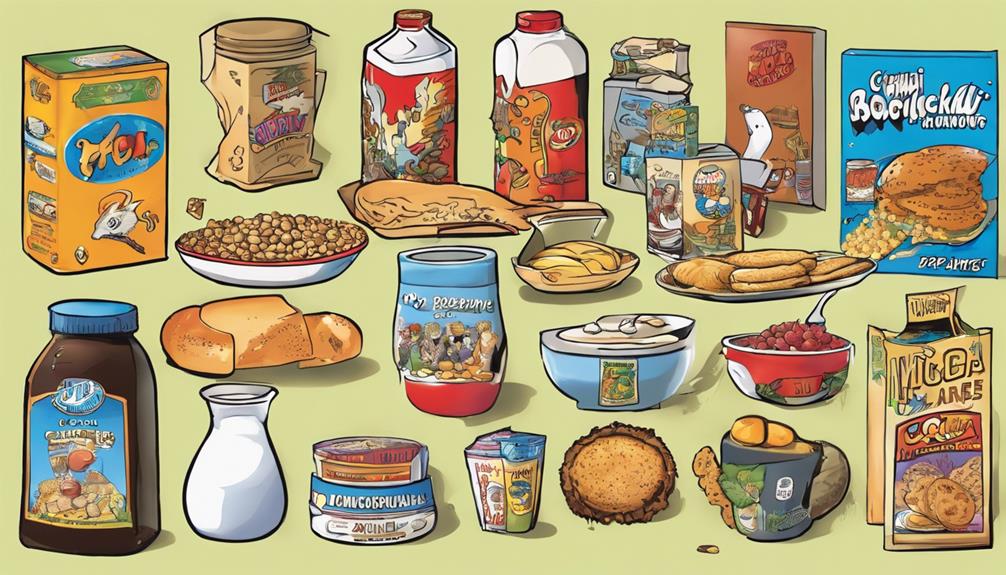Monocalcium phosphate is in your food to improve texture, add nutrients, and aid in processes like leavening. It acts as a leavening agent in baked goods and enriches products like cereals and cheese with essential nutrients. In the baking industry, it enhances quality and reacts with baking soda for ideal texture. Animals benefit from it too, as it supports growth, bone strength, and digestion. For the environment, efforts to extract it sustainably are ongoing. Safety measures are important due to phosphorus concerns. Discover how this common additive benefits your food in various ways.
Key Takeaways
- Acts as a leavening agent in baked goods, providing texture and volume.
- Enriches food with essential nutrients like phosphorus and calcium.
- Found in various food products like baked goods, cereals, and processed meats.
- Enhances quality and appearance of baked goods by controlling carbon dioxide release.
- Assists in nutrient absorption and promotes bone strength in animals.
Uses of Monocalcium Phosphate
Monocalcium phosphate serves various purposes in different industries, ranging from being a leavening agent in baked goods to a source of essential nutrients in animal feed. In baked goods, it acts as a leavening agent, helping dough rise and creating a light, fluffy texture in cakes, bread, and pastries.
Additionally, it's used in animal feed as an important source of calcium and phosphorus, promoting growth and health in livestock, especially in poultry and pigs. This mineral supplement is essential for plant growth in the fertilizer industry, enhancing soil quality and supporting healthy plant development.
Furthermore, monocalcium phosphate plays a role in dental health, strengthening tooth enamel in dental products like toothpaste and mouthwash. It's also utilized as a buffering agent in pharmaceuticals and a clarifying agent in brewing processes.
The versatility of monocalcium phosphate makes it a valuable food additive with various essential functions in different sectors.
Dietary Sources of Monocalcium Phosphate

Commonly found in a variety of food products, dietary sources of monocalcium phosphate include baked goods, cereals, jams, jellies, cheese products, and processed meats. This compound, used extensively in the food industry, serves as a leavening agent in baked goods, contributing to their texture and rise. Additionally, monocalcium phosphate enriches these products with essential nutrients such as phosphorus and calcium, which are crucial for overall health. Its presence in a wide range of food items guarantees that consumers receive these nutrients in an easily accessible form. Below is a table showcasing some common dietary sources of monocalcium phosphate:
| Food Product | Monocalcium Phosphate Content |
|---|---|
| Baked Goods | High |
| Cereals | Moderate |
| Jams & Jellies | Low |
| Cheese Products | Moderate |
| Processed Meats | Low |
Benefits for Baking Industry

In the baking industry, the utilization of monocalcium phosphate as a leavening agent greatly enhances the quality and texture of various baked goods.
When monocalcium phosphate is used, it reacts with baking soda to release carbon dioxide, which is essential for creating a light and fluffy texture in cakes, bread, and pastries.
By controlling the release of carbon dioxide in combination with other leavening agents, ideal baking results are achieved.
The presence of monocalcium phosphate is vital for ensuring that baked goods have the desired texture, volume, and appearance.
It plays a key role in making sure that the final products turn out light, airy, and visually appealing.
Therefore, in the baking industry, the incorporation of monocalcium phosphate as a leavening agent is fundamental for obtaining the ideal texture and quality in a variety of baked goods.
Importance in Animal Nutrition

Monocalcium phosphate is essential in animal nutrition, assisting in nutrient absorption, supporting growth, and development in livestock like poultry and pigs.
It plays a critical role in promoting bone strength, eggshell quality, and digestion, contributing to overall animal well-being.
Nutrient Absorption Benefits
Enhancing nutrient absorption in animal nutrition is essential for promoting ideal growth and overall health in livestock. Monocalcium phosphate aids in the absorption of essential minerals like calcium and phosphorus, important for bone health, muscle function, and overall development. By facilitating improved digestion and nutrient utilization, it contributes to enhanced milk production, quality eggshell formation, and overall well-being in animals.
| Nutrient Absorption Benefits | Importance in Animal Nutrition |
|---|---|
| Bone Health | Essential for development |
| Muscle Function | Critical for movement |
| Milk Production | Enhanced by nutrient absorption |
| Eggshell Quality | Improved through proper nutrition |
| Overall Health | Supported by ideal nutrient absorption |
Monocalcium phosphate is widely used in animal nutrition to ensure that livestock receive the necessary nutrients for proper growth, development, and reproductive performance. Its role in enhancing nutrient absorption underscores its significance in promoting the health and vitality of animals.
Growth and Development Support
Supporting growth and development in animals, particularly in livestock, involves making sure they receive essential nutrients like calcium and phosphorus for best health and vitality. Monocalcium phosphate plays an important role in animal nutrition by providing these necessary nutrients.
It's essential for promoting growth, bone development, and overall health in various livestock species. When added to livestock feed, monocalcium phosphate enhances bone health, digestion, reproduction, and vitality.
By incorporating monocalcium phosphate into animal diets, farmers can guarantee that their animals receive the proper nutrition needed for best growth and development. This nutrient not only supports healthy bone structure but also contributes to improved reproduction and overall vitality in animals.
As a result, monocalcium phosphate is a crucial component in animal nutrition, helping to enhance the well-being and productivity of livestock by providing essential elements like calcium and phosphorus for their growth and development.
Environmental Impact and Sustainability

To address the environmental impact and promote sustainability of monocalcium phosphate, efforts are being made to improve fertilizer management practices and extract phosphorus from waste streams.
The excessive use of monocalcium phosphate in fertilizers can lead to nutrient pollution, soil erosion, and habitat destruction. By enhancing fertilizer management practices, the negative effects on ecosystems can be reduced.
Extracting phosphorus from waste streams helps in utilizing resources efficiently and lessening the demand for new phosphate sources. Monocalcium phosphate contains essential nutrients like phosphorus and calcium, which are essential for crop growth and increasing agricultural yields.
Sustainable practices aim to balance the benefits of monocalcium phosphate with mitigating its environmental impacts. Considering environmental factors is critical for maintaining ecosystem health and promoting agricultural sustainability.
Safety and Handling Considerations

Proper handling and safety measures are essential when working with monocalcium phosphate to prevent potential risks to health and the environment. While classified as non-hazardous in Material Safety Data Sheets, it's important to adhere to recommended guidelines for safe handling. This includes wearing protective clothing to minimize exposure.
Excessive phosphorus present in monocalcium phosphate can lead to environmental issues such as algae blooms if not managed properly. Proper disposal following local regulations is essential to prevent environmental contamination.
Frequently Asked Questions
Is Monocalcium Phosphate in Food Bad for You?
Having monocalcium phosphate in food isn't necessarily bad for you. It's considered safe by regulators and supports bone health. Remember to consume it in moderation. Transparency in labeling guarantees you know what's in your food.
What Are the Hazards of Monocalcium Phosphate?
Hazards of monocalcium phosphate are minimal when consumed in moderation. Regulatory bodies declare it safe, and rigorous handling guarantees safety. Excessive intake may lead to health issues, emphasizing moderation. Companies follow safety procedures.
Is Calcium Phosphate Good or Bad for You?
Calcium phosphate is good for you in moderation. It supports bone health, nerve function, and muscle contractions. Consult a healthcare provider before taking supplements to confirm it benefits your overall health without causing harm.
What Are the Dangers of Phosphates in Food?
Phosphates in food pose risks to your health, such as kidney damage, cardiovascular disease, and bone health issues. Excessive intake can disrupt hormones and affect your kidneys. Be cautious about these additives in processed foods.
Conclusion
In summary, monocalcium phosphate is a versatile ingredient found in various foods and plays an essential role in baking and animal nutrition.
Like a silent worker behind the scenes, it quietly enhances the texture and nutritional value of products we consume every day. Its significance can't be overstated, making it a key component in the food industry and beyond.
Remember, next time you enjoy a freshly baked treat or feed your pet, monocalcium phosphate is there, working its magic.










